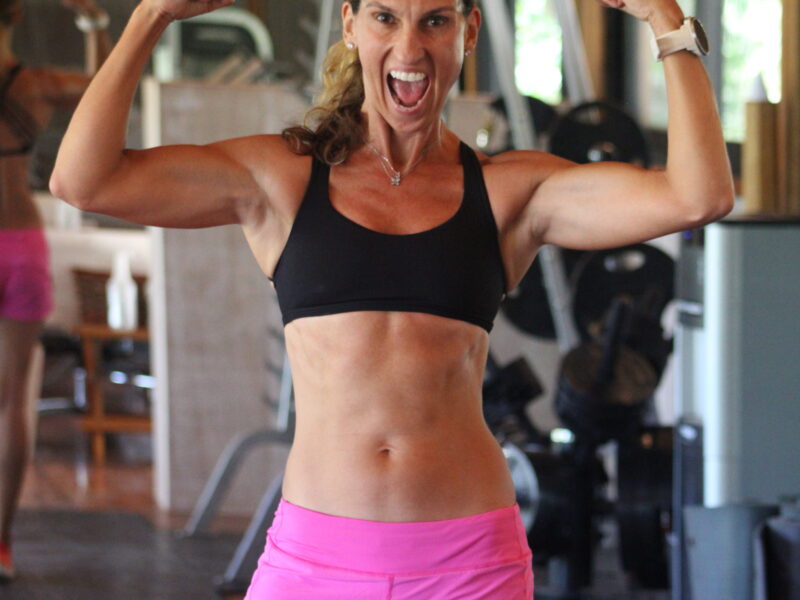Here are Top 10 Strength Training Mistakes

When performed properly, Wikipedia tells us that strength training can “provide significant functional benefits and improve overall health and well-being.” I call it the “Fountain of Youth.” Train correctly, and you can expect bigger and stronger muscles, less fat, better joint function, reduced potential for injuries of all kinds, and more excellent heart health.
However, to experience the benefits,, you must do it correctly! I am a HUGE advocate of ensuring you know what you are doing. Today, in no particular order, you will find the “10 Strength Training Mistakes 🏋🏼.” This is NOT only for triathletes and runners but also for athletes that have been doing strength training for quite some time. And here we go with Dave Letterman’s version of
“Top 10 Strength Training Mistakes 🏋🏼”
10) Comparing Yourself to Others
This is probably one of the biggest causes of injury in the gym. Whether weightlifting, strength training, or enjoying an aerobic workout, never compare yourself to anyone else. There will always be people who are bigger, stronger, and leaner than you are. Unfortunately, no two people are identical, and when you start allowing someone else’s superior gene pool, diet, and workout program to affect your attitude and expectation of your results, you are headed down a path of endless frustration and injury.
As a triathlete, comparing yourself to other athletes in the pool, the road, and the gym could cause injury. For example, you must develop and follow your plan as a triathlete and be proud of your efforts because only you know what to expect from yourself. So I tell my athletes to leave the EGO at the door!
9) Not Eating Enough
Poor diet and nutritional habits are the culprits here. This is especially the case with beginners to strength training. They want to reduce the amount of fat they intake drastically because they erroneously believe that zero fat equals zero fat. However, our bodies need fat to function correctly, and while everyone’s metabolism is different, you cannot maximize muscle mass and strength without enough calories, carbohydrates, proteins, and other nutrients.
And you will need more daily calories than you currently take in when you begin working out. This should be discussed with a coach, gym owner, or nutritionist, so you will know the perfect diet and calorie count you should aim for. I also see this “epic fail” too often in the triathlon world.
8) Eating Too Much
Yes, you need protein to build up those muscles that you tear down when you are training, working out, and lifting weights. But do not overdo it. Several studies have shown that extremely high levels of animal protein in a diet over a lifetime can significantly lead to your chances of contracting cancer. Aside from that, your body needs a specific amount of fuel: Not too much or too little.
As you are not eating enough, do not go overboard on food. Just because you worked out and lifted heavy, you don’t always have to “reinforce” yourself with a donut or two or an excess of poor choices. Consult an expert for the nutritional aspects of strength training, form a plan for eating just what you need for your strength training, and you will be ingesting just the right amount and the correct levels of proteins and carbohydrates to deliver the best results possible. I greatly advocate counting macronutrients: fat, protein, and carbohydrates! Check out my OWN Macro Calculator HERE , and I recommend the “Zone Option.”
7) Entertaining Unrealistic Expectations
Strength trainers, triathletes, bodybuilders, and other fitness-minded individuals frequently make a mistake in this area. By their very nature, people who push their minds and bodies further with every workout constantly strive to improve, which means expecting more and more. This attitude lies at the very foundation of a successful strength training regimen, but there is a fine line you have to tread when measuring results. For example, in the triathlon world, you have been doing triathlons for almost two years and training for your first Ironman Triathlon. You want to go under 10 hours. Something you may want to think about: Is it attainable? Can you do the prescribed distance at that pace? Same thing in the gym! Leave the EGO at the door!
Remember, you should not expect to go from being a 90-pound weakling this week to Mister Olympia next week. While that is a drastic example, you may have suffered from some level of unrealistic expectations yourself in the past. By talking with coaches and experts in the strength training and fitness fields and by being honest with yourself, you will know exactly what to expect given a specific time frame, your current diet, and the type of workout schedule you keep.
 6) Not Getting Enough Sleep
6) Not Getting Enough Sleep
When you strength train, you are tearing down your muscles. Proper nutrition and proper rest help those muscles repair, and as you increase the weight you use in your training regimen, your muscles will grow over time. You cannot function properly, and your muscles will never grow to their maximum size if your body is not well-rested.
The typical human being does not wear down their body during a typical day anywhere as much as a triathlete, a strength trainer, or a bodybuilder does. This means that if you are used to getting by with six hours of rest every night, you are doing your body a huge injustice if you believe that that will be enough sleep when you begin strength training.
Check out my recent blog HERE about sleep.
Multiple studies have shown that sleep deprivation will not only keep you from attaining your fitness and strength goals but also makes subtle changes to your hormone levels and can dramatically increase stress. It would help if you had sufficient sleep for many healthy reasons, so ensure you are getting enough of it. Seriously: Crucial!
5) Not Working out Enough
One of the biggest and most common strength training mistakes is to allow your busy lifestyle to dictate when you work out. If you are serious about strength training for triathletes, you must dedicate at least two days each week to a preplanned and tracked fitness regimen, along with your swimming, cycling, and running!
When you begin to lose fat, you must protect your muscle and bone by causing stress to them since this is what causes lifting weights and strength training to kill fat and build bigger, stronger muscles. Ensure you receive intense weight training workouts at least two days each week, and always, always, always track your results. Off-season would be ideally 3x a week for a triathlete.
4) Not Working Out with Sufficient Intensity
Once you dedicate yourself to at least two days a week in the gym or wherever you are strength training, make sure you are sufficiently stressing your muscles, or your efforts may yield little results. This means relatively heavy weights for each set that you perform. Here is a very easy way to maximize your muscle growth immediately by reaching the appropriate intensity levels with weight training.
Figure what weight equals approximately 65% of your maximum lift (65% ML) during any exercise. Then perform 8 to 12 repetitions, and either 3 or 4 sets each of this number to provide excellent stress and intensity, allowing you to accomplish the most in the smallest amount of time.
3) Waiting for Equipment To Become Available
Especially at the beginning of every year, attendance at your local gym can sometimes dictate that you are waiting in line for a particular piece of machinery. Keep busy any way you can because once your muscles rest and think they are done working out, it is very difficult to get your body back to the “sweet spot” where you are achieving results most efficiently.
If you depend on gymnasium equipment for your strength training regimen, avoid going during peak hours, and begin attending either early in the morning or after 7 PM. If your schedule dictates you attend the gym when it is busy, have alternate options and strength training procedures ready if you are forced to wait on a particular machine to become available.
Texting is getting pretty bad at the gym as well. Leave the phone in your locker. Grab an old-school shuffle and get your workout on!
2) Using the Same Machines, the Same Weights, the Same Reps, and the Same Sets
Unless you want to get fit and stay in shape, which is admirable, you need to push your body’s strength levels to improve them. If you consistently strength train on the same machine at the same weight level, and perform the same number of repetitions and sets, you will become very familiar with one of the most dreaded phrases in the strength training and weight lifting communities: Hitting a plateau.
You cannot simply tear down and rebuild your muscles and expect improved performance over time if you use the same weights the same way. Remember to constantly follow the 65% ML rule we mentioned earlier, and you will not fail to see improvements in your overall strength levels, muscle mass and bulk.
And the Number 1 Reason Is:
1) Quitting before You Achieve Your Desired Results
You have heard the saying, “Winners never quit, and quitters never win.” In strength training and triathlon training, the gains you see in your results and performance are often minimal over the short term. But when you quit because you did not see the results you expected quickly enough, you will never know if you stopped just short of your goal line.
Proper diet, proper rest, proper nutrition, and intelligent strength training and weightlifting plan are all required to discover the maximum performance your body can deliver. But never forget that your attitude dictates everything you do, and the perfect all-around strength training regimen is useless on a piece of paper or on your computer’s hard drive if you do not put it into practice and refuse to quit.
It seems that anyone these days with a blog or social networking profile thinks they are an expert, and that means that good, honest information about proper strength training techniques can become lost in a sea of harmful and possibly dangerous advice. But there is no need to feel frustrated and confused.
Avoid the Top 10 Strength Training Mistakes listed above, and always use common sense if unsure what to do. Since your health is involved, a great rule of thumb here is to err on the side of caution and seek professional advice. Never forget that everyone’s body is different, whether you are just starting out or a seasoned veteran. This means that your goals and level of progress should never be compared to anyone else’s. As long as you are improving and contributing to your overall health, your strength training regimen can be considered a success.

